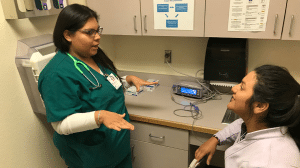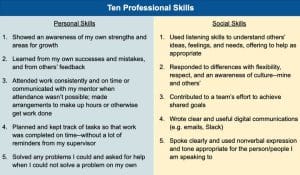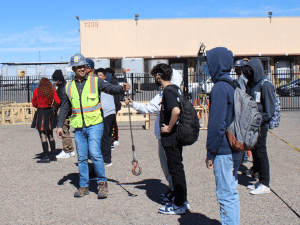The X3 Internship Program Models a Vision for Work-Based Learning
CompetencyWorks Blog
This post is the third in a series related to the Aurora Institute’s report, Expanding Student Access to Work-Based Learning: Federal Policy Recommendations, which outlines the importance of implementing and incentivizing innovative career pathways and presents a role for the federal government to better support and guide states to carry out work-based learning programs.
Ronald (note that student names are changed), a recent graduate of a local high school in Albuquerque, New Mexico, is one of over 30 interns at the University of New Mexico Hospital in the spring 2023 semester. In his role as a UNMH Computer Learning Technologies Intern, he supports the scheduling of required learning modules for new and existing UNMH staff. His supervisor shares that, “we want to help young people to understand the many roles available to them in a hospital setting. It’s like a mini-city, and there are many types of jobs that students might not know about. UNMH is a teaching hospital, and the internship program is an extension.”

UNMH is one of the local employer partners of Future-Focused Education’s (FFE) X3 Internship program. The goal of the program is to open doors to future careers and higher education for high school students. The X3 program is an example of work-based learning (WBL), which NAF defines as “a strategy designed to help students connect what they learn in the classroom with what is expected in the workplace by integrating learning with real-world applications in partnership with industry professionals.” Within this general definition, there are a range of experiences and approaches to WBL. Through a continuum of experiences, students ultimately gain awareness of other career fields, develop professional skills, and are provided the opportunity to demonstrate their skills and knowledge through work experience.
Centering Equity in Design
In New Mexico, many high school students struggle to both contribute financially to their families and stay in school, resulting in too many youth dropping out of school to work, but without good prospects. FFE serves as an intermediary to develop paid WBL opportunities for high school students through its X3 Internship program, which started as a pilot program in 2017 with five interns, some of whom were parenting teens, and one site. The program website notes that: “Paid internships cultivate healthier and more prosperous communities, provide young people with opportunities to grow skills and build their social capital while allowing employers to shape their future workforce and community.” Facing one of the highest youth disengagement rates in the nation in New Mexico, FFE is playing a critical role in functioning as a state intermediary by connecting schools, communities, and employers and encouraging them to think differently about when, where, and how learning happens.
X3 Internship Program Components
The X3 internship program is an example of how WBL can bring a combination of engagement, exposure to relevant career pathways, and transferable skill-building to all students, especially those most likely to be underserved. Each participant is supported by the structures of the X3 program, which include:
- A learning plan that identifies the X3 personal and social skills and the technical skills students will develop in their placement
- Cohort-based learning to facilitate reflection and synthesis of learning in conversation with other interns
- A midpoint site visit and performance review to provide authentic feedback on key workplace skills
- An exhibition of learning and final performance review to celebrate and articulate growth
The ten X3 personal and social skills are cross-cutting competencies that students develop and demonstrate across different internship placements. In each internship, a student focuses on a few of the skills. Over the course of multiple internship placements, students can earn a WorkReady Certificate based on their growth over time in demonstrating the skills in a variety of experiences.

The X3 process is based on relationships and coordination between the school, employers, and FFE as the intermediary organization, all in support of student success. FFE staff support the process from start to finish. They build relationships with employers to identify opportunities. They provide orientation and coaching for the participating students and adults. School-based internship coordinators recruit and match interns to a placement, support interns in meeting expectations, respond to needs and concerns, and coordinate site visits and other logistics. Employer mentors who supervise interns receive orientation to the X3 goals and professional skills that students are working on to help them in setting students up for success and meaningful learning in the work placement.
Integrating X3 into Different School Settings
Some participating schools are reimagining career and technical education by having multiple pathways within a school-wide theme, such as at Health Leadership High School or Architecture, Construction, and Engineering (ACE) Leadership High School. Participating schools offer credit to students completing an internship and some require that every student does an internship as part of their graduation capstone experience.
Isaac, an X3 intern and an ACE Leadership High School student, had recently started his architecture and design internship at an architecture firm that has previously hosted interns. His first days focused on training in a design software that deepened some prior experience with 3-D modeling. Isaac attends his internship on Mondays from 11-5 and on Tuesdays and Wednesdays from 9-12, for a total of 12 hours per week. These internship hours are coordinated with coursework at ACE and a dual enrollment course on water engineering at the University of New Mexico.

Internship experiences allow students to explore their passions and also learn what they might not be as interested in pursuing as a career, both of which can be valuable insights. As one student reflected during the student panel of the EdUprising conference in February 2023, “At first, in my current internship, I was unsure about the medical field, and now I’m more sure I don’t want to go into the medical field. It was a great experience before going to college and wasting money and time and ending up in debt. The experience helped me know what I want to do in my career.” Another student shared that she found a match but early on needed the support to persist and make that discovery: “I’ve been in the same internship for almost two years. In the beginning there was a miscommunication, and I wanted to throw the towel in. My mentors told me to just do it, and now I love it and haven’t left.”

Expanding the X3 Model
As schools in other parts of New Mexico engage with developing their internships and WBL programs, the role of FFE is evolving. The structures and processes can be adopted by schools, employers, and other community partners with the knowledge of the local community and economic opportunities. FFE’s role is as a model and mentor to new coalitions across the state.
As of spring 2023, X3 has provided 1,033 placements in paid internships. Employers pay a per-intern-fee to FFE, and FFE provides intern stipends, payroll management, insurance, training, and evaluation. The organization is a grantee and participant in the Partnership to Advance Youth Apprenticeship (PAYA) network, currently building on the existing internship program to develop the X3 NeXt program for recent high school graduates. This new program combines college coursework, mentorship, and wraparound support to prepare young adults to step into middle-skill jobs in key New Mexico industries.
Through work with the state-wide innovation zone, which has WBL as a programmatic priority, FFE is supporting organizations in other regions of the state to adopt the model and integrate work-based learning into K-12 school systems. As more schools engage as schools of innovation, there is growing potential in New Mexico to create coherent and comprehensive competency-based pathways for students that integrate graduate profiles, experiential learning such as WBL, and capstone experiences.
Read the Posts in this Series
- The Power of Work-Based Learning in Competency-Based Education
- Best Practices for High-Quality Work-Based Learning
- Increasing Access to Work-Based Learning: Federal Policy Recommendations
 Laurie Gagnon joined the Aurora Institute in 2022 as the CompetencyWorks Program Director. She leads the work of sharing promising practices shaping the future of K-12 personalized, competency-based education (CBE). In February 2023, Laurie visited Albuquerque to attend the EdUprising conference and visit FFE X3 internship sites. While there she was delighted to spend some time outdoors with a friend she met at Girl Scout camp over 30 years ago.
Laurie Gagnon joined the Aurora Institute in 2022 as the CompetencyWorks Program Director. She leads the work of sharing promising practices shaping the future of K-12 personalized, competency-based education (CBE). In February 2023, Laurie visited Albuquerque to attend the EdUprising conference and visit FFE X3 internship sites. While there she was delighted to spend some time outdoors with a friend she met at Girl Scout camp over 30 years ago.